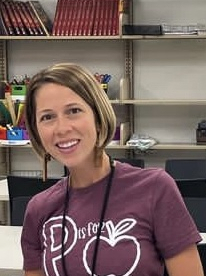<<< Back to December 2023 Newsletter
 |
CAITLIN JOHNSON is the Early Childhood Education Workforce Coordinator for Buncombe County Schools (BCS), where she works closely with the Family and Consumer Science teachers, the BCS Learning Labs preschools serving 3- and 4-year olds, community preschools, and ECE stakeholders to build the early child care workforce in the area. In this role, Caitlin supports everything from field trip opportunities, obtaining certifications, pre-apprenticeships, and promoting a seamless transition from high school into career and college opportunities within ECE. |
Describe your role with Buncombe County Schools.
Buncombe County Schools has a robust Career and Technical Education (CTE) program that strongly values the Human Services pathway, which includes Child Development and Early Childhood Education. I previously worked as a Family and Consumer Sciences teacher while serving as the on-site director for a preschool classroom located within the high school. I taught Child Development and Early Childhood Education classes and my students would complete internships in the preschool. The need became apparent within BCS for the program to have specialized workforce leadership, and I now serve as the ECE Workforce Coordinator. I work with students from across the county who are interested in exploring experiences, career, and higher education within the field of ECE.
How did you come into your role as Early Childhood Workforce Coordinator?
I came into the role through a needs assessment. The role of a preschool administrator was lifted from the Family and Consumer Sciences teachers and a full-time, director position was created. Betsie Stockslager became the BCS Learning Labs director and identified a need for additional workforce support. As folks in the field know, early childhood comes with a lot of regulations and requirements for the staff and environments. It can be challenging to navigate. Ms. Stockslager saw an opportunity for the creation of this position when Dogwood Health Trust, a local non-profit organization, committed grand funding to early childhood workforce development. I have been in this role for several months and feel energized by all the passion within this field. Our community has incredible momentum with this work, as here in Buncombe, we have many leaders in our schools, community, and government who are passionate about high-quality learning environments for young children and promoting a strong workforce to grow our youngest learners.

The response has been wonderful. For this first semester, we have had three students (out of 14) sign up as pre-apprentices. We will be holding the first, of what we hope to be many, signing ceremonies. We want to celebrate our young professionals and acknowledge them for the hard work and exciting opportunities they will have in their future. Employers, community leaders, and our school system have been incredibly supportive, and everyone is eager to see this program grow. We have been working with employers around the county to increase the number of registered apprenticeship sites as well. Our goal is to establish partnerships in all districts so students at every high school can access the opportunities that Building Bright Futures, ApprenticeshipNC, and CTE have created. It is a win-win for the community. For the spring semester, we will be offering the pre-apprenticeship opportunity to 65 students, so we anticipate a larger cohort and are gearing up for that.
What do you want readers to know about pre-apprenticeships in ECE?
There are over 100 high schools in NC that offer Child Development and ECE classes to students, which is the pathway to pre-apprenticeship. As highlighted by Valerie Williams in the October BBF Spotlight, these programs are an incredible opportunity for young people to gain life-long skills. Since our CTE ECE programs are defined as a pre-apprenticeship by design, students who are interested in this pathway have a built-in opportunity. Here in Buncombe County, we are viewing this pre-apprenticeship as a way to further elevate, acknowledge, and incentivize our young professionals in-training. Early childhood is a field that deserves to be celebrated! I want readers to know that our state is filled with eager, intelligent, strong young people. Collaborating with our CTE programs is a great way to gain access to our state's future leaders and workforce.
What advice do you have for employers considering ECE pre-apprenticeships?
As previously emphasized, I would encourage employers to connect with their local CTE programs and see what is happening in our schools! Many schools host career fairs, welcome guest speakers, and seek field trip experiences. Even if a school is not able to offer ECE I and pre-apprenticeship opportunities, I would encourage employers to think creatively. For example, our local Smart Start, Buncombe Partnership for Children, is currently becoming an apprenticeship site. They have created an early childhood substitute training program that offers paid hands-on training, higher education, certifications, and opportunities for participants to experience working in different centers. We are working with them, as well as other apprenticeship sites, to connect students who do not have the ability to take ECE I in high school but could earn high school credit via CTE internship by working with these employers.
Why is it important to get high schoolers involved with pre-apprenticeship?
We know that when a student enrolls as a pre-apprentices they have demonstrated characteristics of a notable individual. I often remind students that by enrolling in ECE I, they have proven qualities that make them stand out from the crowd. Responsible, passionate, reliable, and trustworthiness, are qualities they possess. The pre-apprenticeship offers students an opportunity to sharpen those qualities and build on new ones in ways that can only be learned through doing. When high school students work with young children and become the leaders in the classroom, their confidence blooms authentically and holistically. Young children respond so well to the students, they look up to them and notice when they aren't there. For high school students, feeling so genuinely valued and loved can make all the difference. To take those experiences and have guided mentorship and navigation in their professional pursuits is invaluable. These programs are life-changing for many students and the ripple effect they have on communities has the power to make generational change.